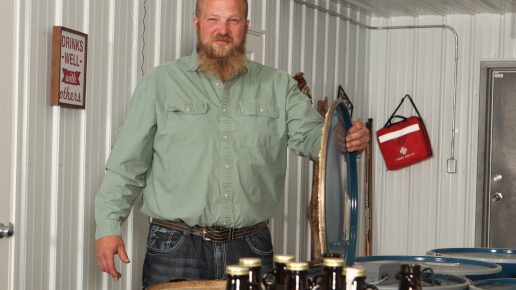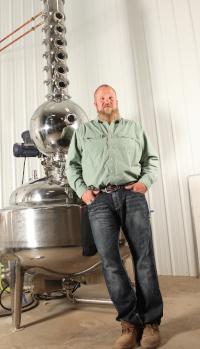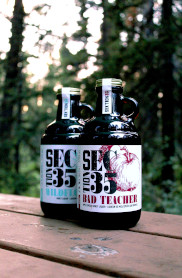
Canadian farmers know what it means to make lemonade from lemons. But what do you do when you’re in the certified seed-growing business and life offers you buckets of honey? That’s the problem Kevin and Kyla Lefsrud encountered when they let a neighbour put beehives on their land near Viking, AB. In exchange, “they started paying us in honey for rent,” says Kevin. It was a sweet deal until the family realized they simply couldn’t eat the payments.

The Lefsruds, Kevin pictured here, could not find a still locally so they went online, had it shipped, put it together and the experiment making honey-based liquor began.
A fourth-generation farmer with a taste for fine spirits, Kevin knew the provincial government of the day was making it easier to open small distilleries in Alberta. He also knew honey-based liquor presented a niche opportunity. When he couldn’t find a local still to experiment with, Kyla found one online. Kevin put it together and the research began.
Kevin took a five-day intensive workshop in B.C. then translated what he learned about grain fermentation to honey. He quickly found out that beekeepers harvest several renderings a season, each rendering has a distinct flavour and they don’t all make good-tasting alcohol. “There’s a reason there’s only a handful of us in North America who use honey in the fermentation process,” says Kevin. “We started making some meads and wines, but soon realized we weren’t very good at that.”
More than five years and $400,000 later, Kevin has sober advice for farmers who want to open a value-added farm business: go for it, but pay attention to details and be honest about how much time and money you can devote to a new enterprise. “I had to ask myself: ‘Are you going to be a farmer or a distiller?’ If you’re going to be both, you’re going to have to hire more people or use the people you hire differently.”
FROM HIVE TO GLASS
Opened in 2017, Section 35 Farm Distillery sells two honey-based types of liquor. Bad Teacher is a hand-crafted blend of apple, spices and honey spirits. Wildflower is a vodka-inspired liquor made from the last renderings of the hive. The company name bears homage to the location of the distillery, on section 35 of the 116-year-old, fourth-generation family farm that grows certified varieties of oat, barley, canola and wheat seed on about 4,000 acres.
 Lynette Lefsrud, Kevin’s sister, joined the ownership team soon after the first sale. She brought her MBA and decades of small business consulting experience to the enterprise. “I handle all of the paper and we work together on marketing plans,” she says.”Kevin is great at sales and he has a very good palate.”
Lynette Lefsrud, Kevin’s sister, joined the ownership team soon after the first sale. She brought her MBA and decades of small business consulting experience to the enterprise. “I handle all of the paper and we work together on marketing plans,” she says.”Kevin is great at sales and he has a very good palate.”
Soon after joining Section 35, Lynette entered Bad Teacher in the Alberta Beverage Awards, earning a 2019 prize for Best in Class. Then a Calgary cousin gave a bottle to a neighbour who owns several liquor stores in that city. One of those stores started carrying the product. Section 35 also hooked up with Liquor Connect, an Alberta-based online service consumers use to find stores that carry the products they want.
Noting how sales rose after tastings, the distillery’s 2019 marketing strategy focused on farmer’s markets, where it’s legal to give adults a small sample. They also handed out recipe cards for easy-to-make cocktails.
In 2020, COVID-19 ended plans to bring agri-tourism to the farm and shut down most farmer’s markets, putting an end to their goal of selling a record 3,000 bottles this year. Some of the lost liquor sales were recouped by selling hand sanitizer, a honeyfermented alcohol product where the nectar source doesn’t matter.
Behind the scenes, Kevin is still experimenting. These days, Bad Teacher and Wildflower are triple-distilled, “for an even better-tasting, smoother liquor,” notes Lynette. Down the road, Kevin hopes to be able to run a batch of Section 35 alcohol through the still, taste it and decide then if he’s going to make it into a whiskey, vodka, gin or rum. “I want to get to the point where everything revolves around a particular batch of honey,” he says. In short, Section 35 is just getting started.
In the meantime, the company runs lean. No one takes a salary and they don’t pay rent. The commercial still cost about $40,000. The rest of the money went into a top-end 40 x 100-foot farm building. With an F1 code, the building could eventually be repurposed for some other type of commercial operation, says Kevin.
HELP FOR THE ASKING
The Lefsruds’ business experience positioned them for value-added success. Certified seed and liquor both demand strict attention to detail and production protocols, and on-farm seed cleaning and sales boosted their understanding of vertical integration.

COVID-19 ended the Lefsruds’ plans to sell a record 3,000 bottles of liquor this year but
switching gears and producing honey-based hand sanitizer (below) helped them recoup
some of their losses.
Farmers who want outside input into a business plan should talk to their lender, says Sasha Musij, a business-development specialist in the agribusiness and agri-food sector of ATB Financial. “We’re keen to hear ideas at any stage, especially if we are supporting your business elsewhere.”
Pandemic aside, Musij says interest in new ventures remains high. “Is it always going to be the best idea or the right idea? Ultimately, that’s for the client to figure out. But we’ll be there to help, to advise.”
The provincial government also offers support, adds Kathy Bosse, a new venture specialist with Alberta Agriculture and Forestry. Lenders want to see business plans that help them understand a new business and know it can be successful. “We can help you gather and understand all of the information you need,” she says. Her office also helps with everything from calculating costs of production to product pricing and market development.
A former CFL player (offensive line) with the Montreal Allouettes and Edmonton Eskimos, with three Grey Cup rings under his belt, Kevin Lefsrud admits Section 35 “is keeping me a little busier than it probably should be and I’m relying on my hired help for more work on the farm than I have in the past.”
He also thinks the venture helps him deal with brain injuries caused by two concussions suffered in 2007. “I don’t remember my youngest daughter being born. I don’t sleep a whole lot and my brain is going all of the time, but being able to work on the distillery is good.”
